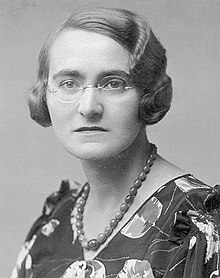Lidia Zamenhof
| Lidia Zamenhof | |
|---|---|

Lidia Zamenhof before
the Nazi German invasion of Poland |
|
| Born |
29 January 1904 Warsaw, partitioned Poland |
| Died | 1942 (aged 37–38) Treblinka extermination camp |
| Nationality | Polish |
| Other names | Lidja |
| Known for | Activity in Esperanto movement and Bahá'í Faith |
| Parent(s) |
L. L. Zamenhof (1859–1917) Klara Zamenhof (1863–1924) |
Lidia Zamenhof (Esperanto: Lidja; 1904–1942) was a Polish writer, publisher, translator and the youngest daughter of L. L. Zamenhof, the creator of Esperanto, an international auxiliary language. She was born on 29 January 1904 in Warsaw, then in partitioned Poland. She was an active promoter of Esperanto as well as of Homaranismo, a form of religious humanism first defined by her father.
Around 1925 she became a member of the Bahá'í Faith. In late 1937 she went to the United States to teach that religion as well as Esperanto. In December 1938 she returned to Poland, where she continued to teach and translated many Bahá'í writings. The exact date in which she was murdered is unclear. In the The Central Database of Shoah Victims' Names, three conflicting testimonies are given for her exact date of her death: July 5, October, and September 5 in 1942. Hence, her exact murder date was in the latter part of 1942. She was murdered at the Treblinka extermination camp during the Holocaust in Poland.
Lidia Zamenhof learned Esperanto as a nine-year-old girl. At the age of fourteen she had already done translations from Polish literature; her first publications appeared several years thereafter. Having completed her university studies in law in 1925, she dedicated herself totally to working for Esperanto. In the same year during the 17th World Congress in 1925 in Geneva she became acquainted with the Bahá'í Faith. Lidia Zamenhof became secretary of the homaranistic Esperanto-Society Concord in Warsaw and often made arrangements for speakers and courses. Starting at the Vienna World Congress of Esperanto in 1924 she attended every World Congress. (She did not attend the 1938 Universala Kongreso in England, as she was in the United States at the time.) As an instructor of the Cseh method of teaching Esperanto she made many promotional trips and taught many courses in various countries.
...
Wikipedia
